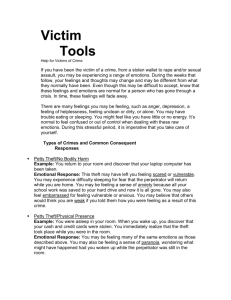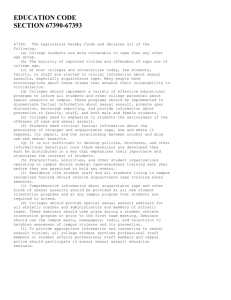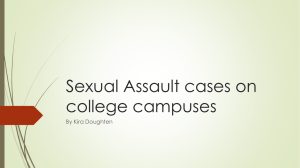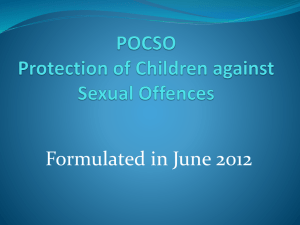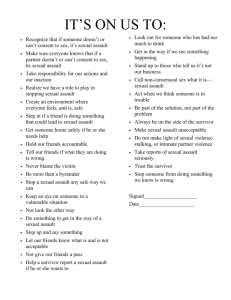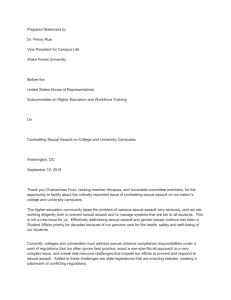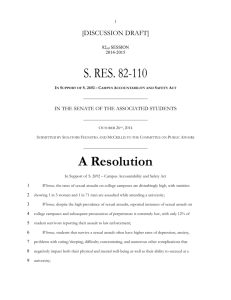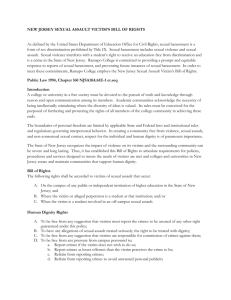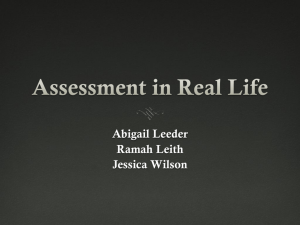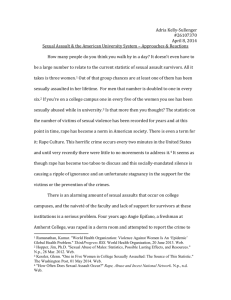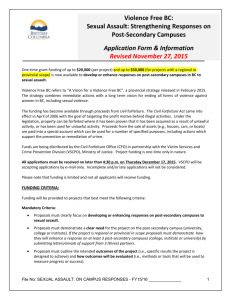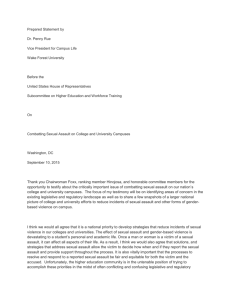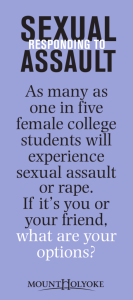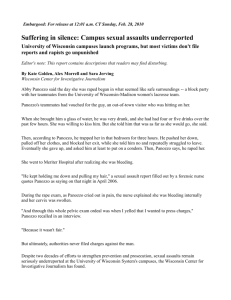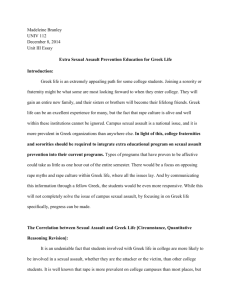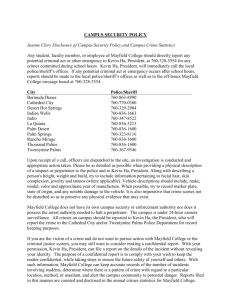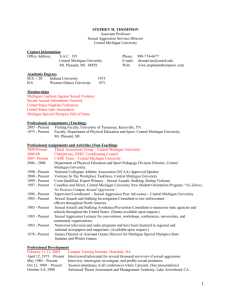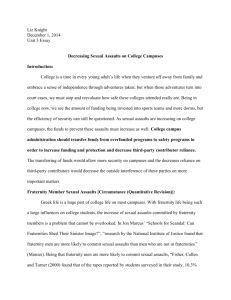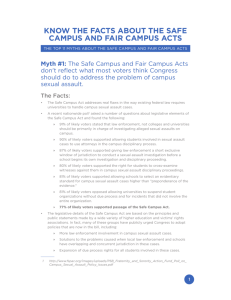CNN A Silent Threat on College Campuses
advertisement
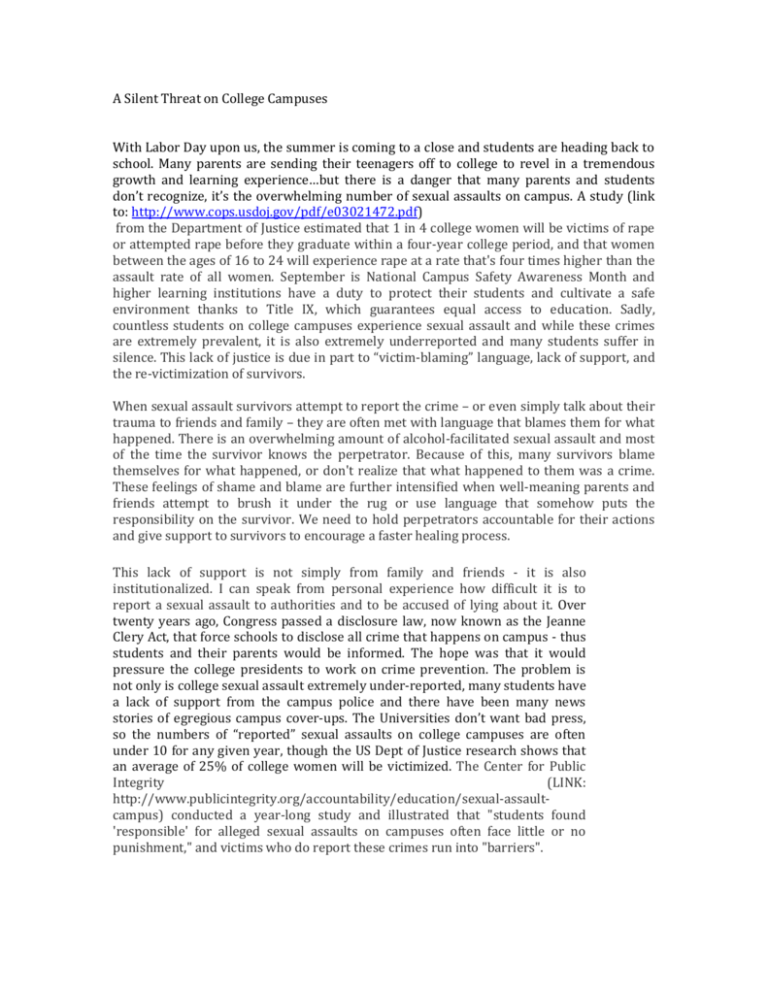
A Silent Threat on College Campuses With Labor Day upon us, the summer is coming to a close and students are heading back to school. Many parents are sending their teenagers off to college to revel in a tremendous growth and learning experience…but there is a danger that many parents and students don’t recognize, it’s the overwhelming number of sexual assaults on campus. A study (link to: http://www.cops.usdoj.gov/pdf/e03021472.pdf) from the Department of Justice estimated that 1 in 4 college women will be victims of rape or attempted rape before they graduate within a four-year college period, and that women between the ages of 16 to 24 will experience rape at a rate that's four times higher than the assault rate of all women. September is National Campus Safety Awareness Month and higher learning institutions have a duty to protect their students and cultivate a safe environment thanks to Title IX, which guarantees equal access to education. Sadly, countless students on college campuses experience sexual assault and while these crimes are extremely prevalent, it is also extremely underreported and many students suffer in silence. This lack of justice is due in part to “victim-blaming” language, lack of support, and the re-victimization of survivors. When sexual assault survivors attempt to report the crime – or even simply talk about their trauma to friends and family – they are often met with language that blames them for what happened. There is an overwhelming amount of alcohol-facilitated sexual assault and most of the time the survivor knows the perpetrator. Because of this, many survivors blame themselves for what happened, or don't realize that what happened to them was a crime. These feelings of shame and blame are further intensified when well-meaning parents and friends attempt to brush it under the rug or use language that somehow puts the responsibility on the survivor. We need to hold perpetrators accountable for their actions and give support to survivors to encourage a faster healing process. This lack of support is not simply from family and friends - it is also institutionalized. I can speak from personal experience how difficult it is to report a sexual assault to authorities and to be accused of lying about it. Over twenty years ago, Congress passed a disclosure law, now known as the Jeanne Clery Act, that force schools to disclose all crime that happens on campus - thus students and their parents would be informed. The hope was that it would pressure the college presidents to work on crime prevention. The problem is not only is college sexual assault extremely under-reported, many students have a lack of support from the campus police and there have been many news stories of egregious campus cover-ups. The Universities don’t want bad press, so the numbers of “reported” sexual assaults on college campuses are often under 10 for any given year, though the US Dept of Justice research shows that an average of 25% of college women will be victimized. The Center for Public Integrity (LINK: http://www.publicintegrity.org/accountability/education/sexual-assaultcampus) conducted a year-long study and illustrated that "students found 'responsible' for alleged sexual assaults on campuses often face little or no punishment," and victims who do report these crimes run into "barriers". Universities need to protect survivors – yet often they are re-victimized by being forced to see their perpetrator on campus day in and day out. This can have a significant adverse effect on their ability to thrive in their educational studies. When Annie Clark, a former UNC student went to report, she was re-traumatized in the process. The school official said, “Rape is like football, if you look back on the game, and you're the quarterback, Annie... is there anything you would have done differently?" Link: http://www.huffingtonpost.com/annie-e-clark/rape-is-like-a-footballg_b_2769576.html A former student of Southern Connecticut State University Wendy Wyler says she was sexually harassed and touched inappropriately by a music professor, yet he is still on staff. http://www.ctpost.com/news/article/SCSU-student-claims-sexual-harrasment-by-prof2682505.php Universities need to hold perpetrators accountable and stop the re-traumatization of survivors as well as cultivate a healthy environment that does tolerate sexual violence or sexual bullying. These issues can be mitigated with a clear, comprehensive, and easy to find sexual assault policy and a commitment to professional development on these issues and prevention education. We need to educate parents that even if the University you are sending your daughter to has an unusually high number of reported sexual assaults, it doesn’t necessarily mean that the school is comparatively un-safe, in fact it can illustrate the exact opposite. Schools that encourage a safe reporting environment for students to seek justice can create the illusion of an “un-safe” school – but can simply mean that schools are encouraging students to seek and receive justice. It is crucial for campus officials to commit to creating safe environments where students can learn and thrive. Angela Rose is founder of PAVE: Promoting Awareness, Victim Empowerment, a nonprofit that works to prevent sexual violence. PAVE is convening a National Campus Sexual Assault Summit in DC on to focus on prevention, policy and intervention. Rose is the author of “Hope, Healing & Happiness: Going Inward to Transform Your Life.” https://www.createspace.com/4224657 She is on Twitter @AngelaRosePAVE
